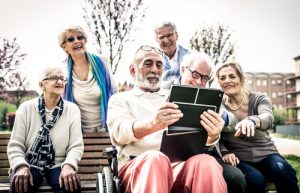Men and women of ages 40 and older should consider having a healthy social circle. It is just as important as physical health.
According to the Anxiety and Depression Association of America, 15 million adults suffer from social anxiety, which is the third largest mental health problem in the world today. These numbers increase when the baby boomer population is considered. Most people focus on their physical health and even their spiritual well-being, but just a few moments with friends and family can have major health benefits.
The Decline of a Social Life
A social life is easy to come by when a person is growing up (though this may not be true for all); many social spaces are readily available for youth, such as school, parties, social clubs, slumber parties, sports and others.
However, once you reach your 40s and 50s, life events such as divorce, illness or even death may claim those you love, and you find yourself wanting to stay home more. Perhaps you do not do so by choice, but certainly life has shifted and anxiety increases.
Shows like The Golden Girls are successful because this particular show features older women who have made a life with each other and they actively participate in dating, dinners, theaters and outings. All of these activities prove important for their mental wellbeing.
Why You Should Have a Healthy Social Circle

Gone are the days where one would sit home alone in depression. Now there is real data available, proving that socializing can boost one’s health just as any dose of medicine could.
For example, the 2017 Pew Research shows that using social media to connect with friends and family greatly improved mental stamina for adults. Social engagement is associated with a strong immune system, and interacting with others decreases depression.
There is growing evidence that having a social life may protect against dementia and even improve memory.
A limited social life can cause serious physical and mental health problems:
- Cardiac failure
- Anxiety
- Depression
For those who are looking to have more “real” social interactions and just need the support, consulting your doctor would greatly help. Your doctor has access to support groups for you for nearly every facet of life. There are art therapies, support groups for widows and widowers, support groups for those with anxiety and many others that would fit your needs. Most groups are led by those who have experienced what you have.
On the fun side, there are great social groups to belong to that are tied by a common interest, such as walking, swimming, bingo, parlor games and many others.
Searching for meetups within your locale or meetups on a topic you are interested in will bring up helpful suggestions. The COVID-19 pandemic has contributed to making many of these meetups available online.
The Benefits of Social Media
For those who want to connect with others but feel there is no way to, social media has made it easier to develop a healthy social circle.

- Skype
- Zoom
- Facetime
The Benefits of Having a Healthy Social Circle
As people age, they benefit from social contact as it helps them build a cognitive reserve. A person will develop greater ability to handle damage from health conditions. Someone who has a good circle of friends will have well-developed memory and language skills. This will help the person cope longer and delay the development of health issues.
Research has shown there are many health benefits for people who are socially engaged. A study of over 240 African Americans with hypertension showed that social networks helped them control the condition. Established social circles will also promote a healthy lifestyle. People find it easier to follow a healthy routine if they are around others who do the same.
As people get older, regularly being around others will help them be safer. Someone is more likely to be there if the older person falls. The person can depend on his or her community and social circle to help in dealing with many types of situations. The more social a person is with others in their neighborhood, the safer a person will feel. This will encourage them to go on walks, get regular exercise and more.
As people age, their mobility may decrease, which affects their independence. This may be the time for them to rely on others for help. This situation is made more difficult if a person withdraws from social interaction. A healthy social circle will have family members, friends and even paid assistants to help with personal care when necessary. These are people who can help with shopping, doctor’s appointments and more if mobility is an issue.
People will have higher levels of cognitive function when they experience increased social interaction. Research has shown that women who maintained a large social network as they got older had a significant decrease in their risk for dementia. These women also delayed or prevented experiencing cognitive impairment.
Developing Social Circles
There are certain things people can do to develop a healthy social circle as they age:
- Travel—Going new places encourages interactions with others. It can expose people to different cultures or different parts of their city or state.
- Volunteer—This is an excellent way to meet others who share a particular passion. It can create strong connections based on beliefs and values.
- Classes—There are many types of workshops and college courses where people will meet to learn a particular subject. It could also be a way to acquire new trades and skills.
- Hobby—Practicing something people love and sharing it with others is a great way to meet people. People need to pick a hobby that truly interests them.
This is a great time to deepen friendships and develop new ones. It can be scary for some, but this is a normal feeling and another reason for you to be the one to choose how you want to socialize. Healthy socialization is the key ingredient to a healthy mind and body, and in the words of Hellen Keller, “Alone we can do so little, together we can do so much.”





